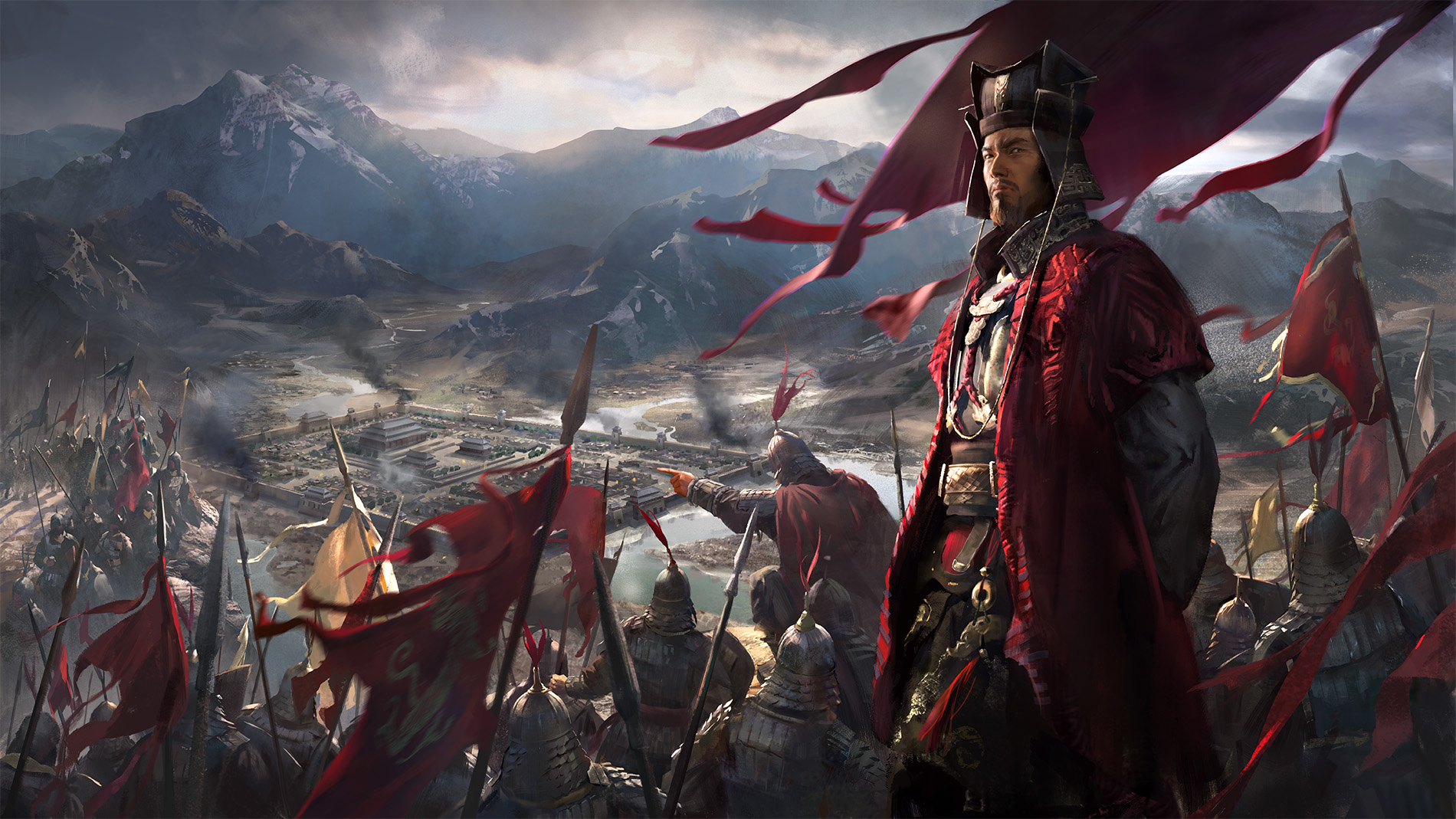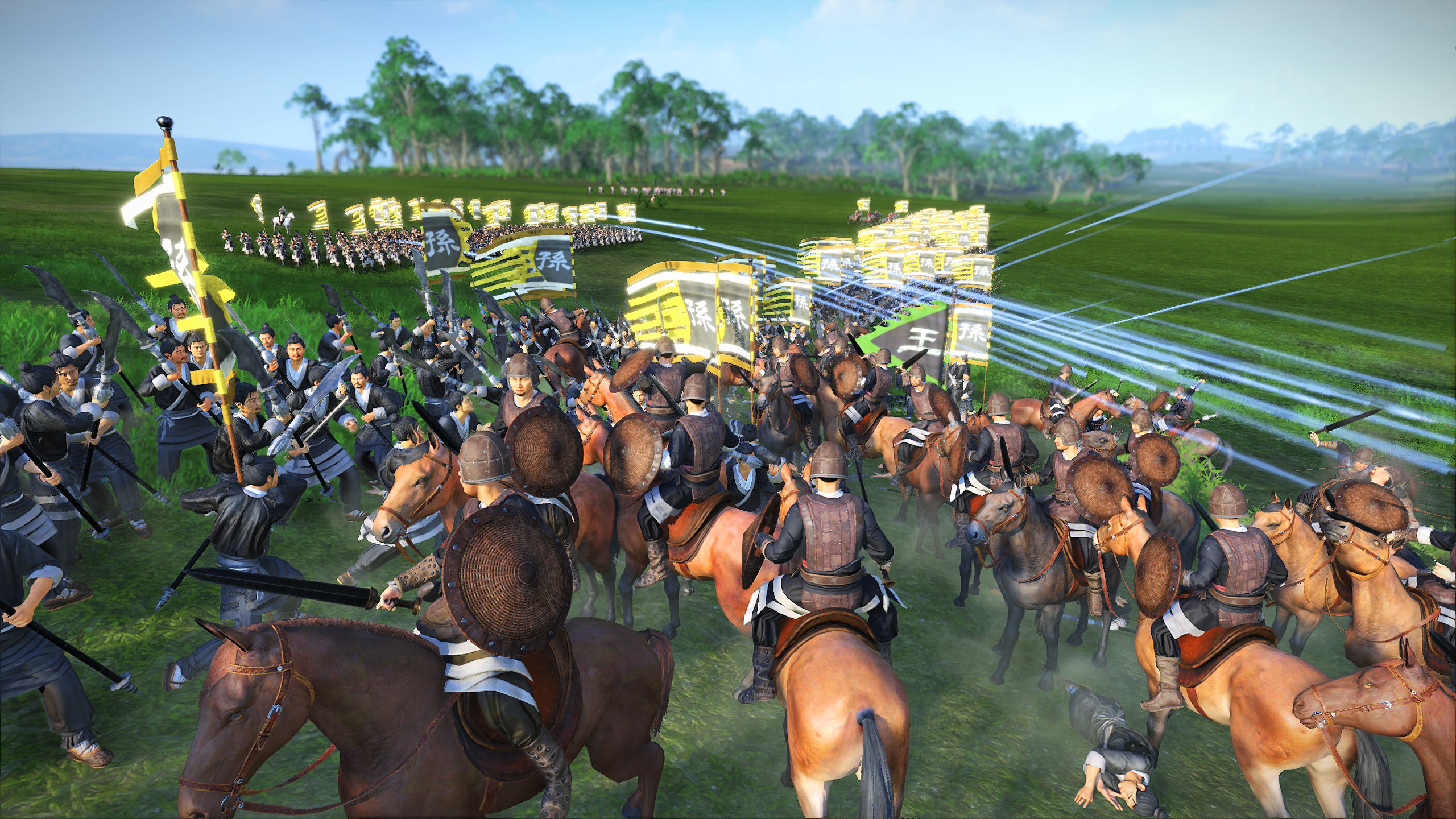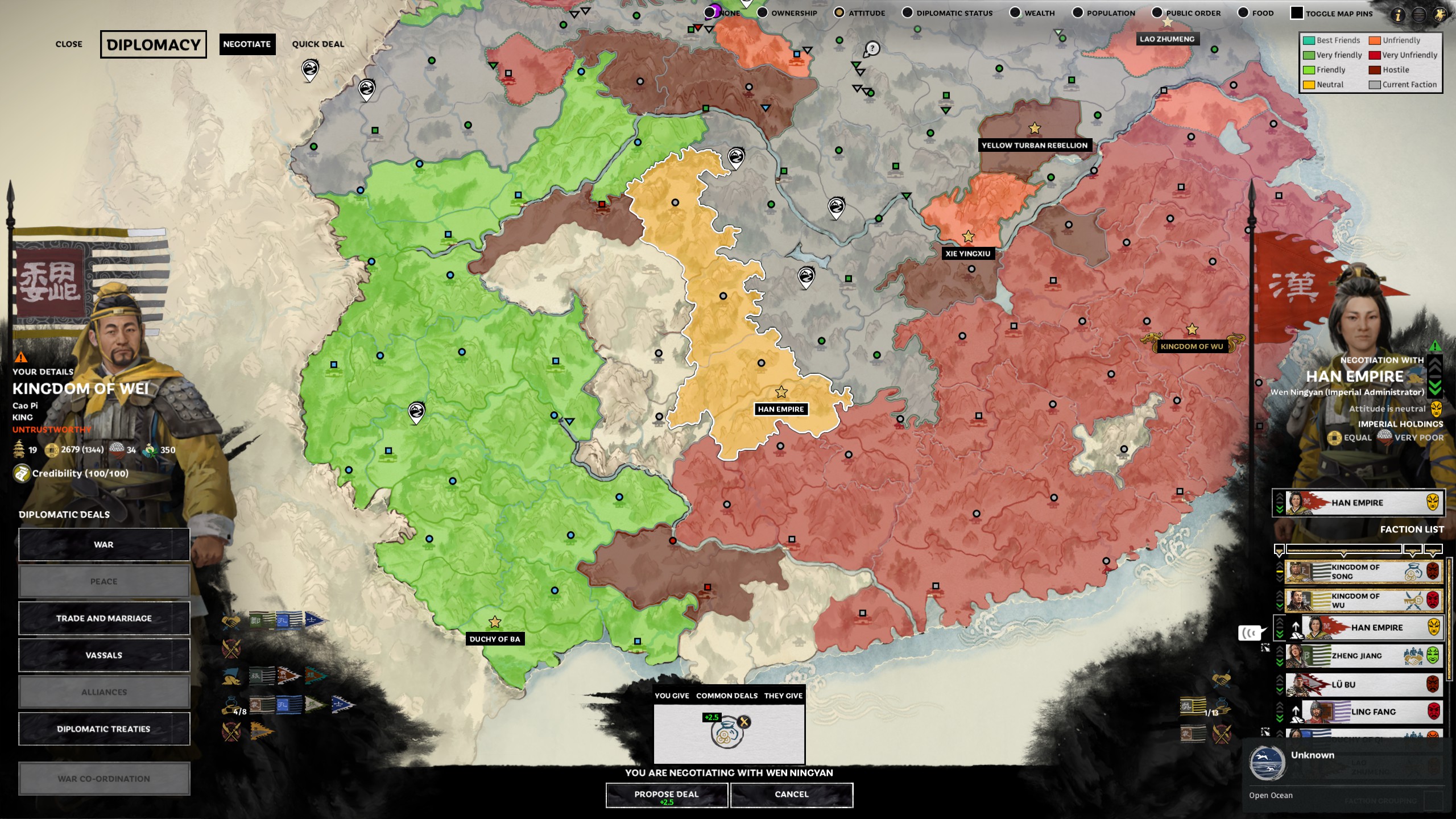Total War: Three Kingdoms finally gets diplomacy right
War of words.

Total War has always been a bit of a misnomer, with even the first Shogun giving you a way to broker peace and get some breathing space. Since then, diplomacy has occupied an increasingly large place in Total War, but it's always felt like the series' most inconsequential battlefield. In Total War: Three Kingdoms, however, it's become the linchpin in my campaign.
Creative Assembly shoves diplomacy into the spotlight by suggesting Cao Cao as the leader for your first game. He doesn't begin in the safest starting position, surrounded by potential enemies, but his faction's unique diplomatic abilities let you talk people into fighting wars for you and manipulate the relationships between your opponents.
Every leader gets a broad range of diplomatic and diplomatic-adjacent options, regardless of fancy abilities, and with the AI prone to joining forces, you'll want to cozy up to at least some factions if you're going to declare yourself Emperor. While there's a discrete diplomacy system for bargaining between factions, these deals and treaties are informed by personal relationships, plots and what you've been getting up to with your armies. There are plenty of ways to make diplomacy a more efficient weapon, each getting you to fiddle around with a different part of the game.

You've got to negotiate and figure out ways to put pressure on the other leaders. If you want something, you don't need to jump straight into a war after the first diplomatic request is denied. When I wanted my pal, Liu Bei, to join me on my very justified war against my neighbour Sun Jian, I had to butter him up first. He was not interested in my admittedly quite boring accountant but did settle for a half-decent horse and a bunch of cash. If he'd held out for more I probably would have given him a really cool sword, but he left the deal satisfied and ready to march on my enemies.
So you're able to leverage your personal relationship with a leader and even your own possessions to make a deal on behalf of your faction. I could have also thrown another treaty into the mix, or even arranged a marriage. The individual-level and faction-level systems constantly sidle up alongside each other, so it doesn't feel like you're switching between managing characters and managing your empire.
Negotiation hardly has the thrills of armies clashing, but when you've worked hard to make a deal, the results can feel just as rewarding. And one of the reasons diplomacy fits in so well this time around is that it's very aggressive, especially as Cao Cao. At first, because of his focus on diplomacy, I played him as pretty laid back, always looking to make friends and find peaceful solutions, and while that's now a more viable route to victory than in previous Total Wars, and it's even a recommended strategy for some leaders, Cao Cao's really meant to wield diplomacy like a dagger.

Eventually, I started to throw my weight, or my Credibility, around. First, I spent some of my unique diplomatic currency on making my ambivalent neighbours love me, and then I started making deals, offering a bit of gold, a nice spear, military access or other paltry things, all to incite a proxy war. My war with Sun Jian was on hold, but he had more armies than I did and was clearly gearing up to reignite the conflict before I was ready. By distracting him with other wars against weaker factions, I bought myself enough time to build more economic buildings and get my economy in order, allowing me to field more troops. While his armies were engaged, I declared war and marched straight to his capital.
The biggest gaming news, reviews and hardware deals
Keep up to date with the most important stories and the best deals, as picked by the PC Gamer team.
The AI seems generally a lot more receptive to talking, and more flexible, too. Sometimes they'll not be interested in anything you have to offer, but more often they just need the right carrot dangled in front of them. They're even open to the idea of becoming a vassal. They're a bit different in Three Kingdoms. Vassals have a significant amount of autonomy and can ask for a guarantee that they won't be annexed, so the AI is more likely to become one if it needs the protection of powerful faction. It's even something you might consider as a player, if you're down on your luck and need a shield while you pick yourself back up again.
Once I'd generated enough prestige to turn my faction into a kingdom, the offers from weaker factions started rolling in. They wanted to pay me and shower me with gifts just so I'd vassalise them. It was a smart move. The map had become a battlefield between three major powers, and everyone else was at risk of being swallowed up. It saved me needing to take them over later, but it also meant I had a responsibility to protect them. I was hesitant, though, as a once loyal vassal had previously turned, starting a war for independence right when I was fighting a war for less noble reasons.

The new coalition option, meanwhile, gives you a stepping stone to massive military alliances, letting groups of factions work together without making lots of individual deals. It's a much neater system, and it also opens the door to bigger wars earlier on. You don't need to join any wars involving your fellow members, however, so it's a more attractive option when you're not ready for a big commitment.
All my scheming (and many, many battles) paid off once I'd taken the capital and declared myself Emperor. There were others, too, unfortunately, and one of them happened to be my best mate. We'd been in a coalition together since the start, eventually becoming allies, and we always had each other's back. There's only room on the throne for one butt, unfortunately, a point reinforced by the quest that told me to destroy my old friend.
Three Kingdoms' endgame doesn't chuck out diplomacy—building an alliance against the other kingdoms is a priority—but it can change relationships dramatically. Before I knew it, I was in a new coalition featuring half of the game's factions, many of them old enemies, and I was frantically throwing my armies north to stop my best mate from burning down my cities.
The diplomacy system, coupled with the intricate web of character relationships, isn't just a very handy strategic tool, it's a factory for stories full of betrayals, secret pacts and enemies coming together to fight an evil usurper. Even in the otherwise excellent Warhammer 2, it felt underdeveloped, but here it's become utterly vital.

Fraser is the UK online editor and has actually met The Internet in person. With over a decade of experience, he's been around the block a few times, serving as a freelancer, news editor and prolific reviewer. Strategy games have been a 30-year-long obsession, from tiny RTSs to sprawling political sims, and he never turns down the chance to rave about Total War or Crusader Kings. He's also been known to set up shop in the latest MMO and likes to wind down with an endlessly deep, systemic RPG. These days, when he's not editing, he can usually be found writing features that are 1,000 words too long or talking about his dog.

